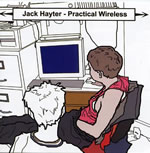|
|
 |
Dusted Reviews
Artist: Jack Hayter Album: Practical Wireless Label: Absolutely Kosher Review date: Sep. 9, 2002 |

|
|
|
 |
Hefner guitarist goes it alone
History has shown us that sometimes a singer/songwriter can lack a fundamental element of the musical formula – namely, the voice – and still do quite well. All things considered, Louis Armstrong had no business singing, and yet music is much better for his having done so; the same is true of Stephen Malkmus. Nobody questions the validity of Bob Dylan despite his terribly charismatic rasp, and Lord knows the latter-day Tom Waits shouldn't logically be allowed near a microphone, yet he is a widely respected singer.
The chances, then, are better than one might expect for the solo career of Hefner guitarist Jack Hayter: it's not that he can't sing but that he doesn't seem to feel the need to, and perhaps he's right – his mellow, contemplative songs are probably better suited to his raspy whisper than to anything else. The twelve songs on Practical Wireless never rise to the occasion of rocking out, but hold their own in a context paved by Nick Drake, Elliott Smith, and, most of all, the aforementioned Dylan.
The songs on Wireless are not rock songs. They float by benignly, not always noticeable and, more often than not, a bit opaque, but gradually they set a tone and reflect Hayter's somehow intimate detachment with gentle instrumentation and imprecise acoustics. He leaves them stripped down rather than risk overdoing them with anything more than a guitar and lightly brushed drums; even when the always-welcome accordion and pedal steel chime in, they might as well go unnoticed for all the impact they make.
Despite occasional forays into more modern sounds (the Elliott Smithiness of "Mary Honey," the Mojave 3 drawl of the Only Ones' "Another Girl Another Planet"), Hayter never strays too far from Dylan's gloomy-troubador school of songwriting. If anything his gruffness and a touch of eccentricity (the liner notes are inscribed "maybe your children will have more interesting teeth") recall Waits's general confoundingness, but Hayter manages to cast the muses of both giants in his own dim light.
His lyrics, meanwhile, spin no compelling narratives but instead fade into the background with the rest of it; song titles like "Misfortune's Big Statue" and "Smoking A Consulate" pretty well sum up his wit: like the rest of his music, intelligent, but not so much as to be imposing.
While Wireless is smart, it is not erudite; rather, it rings of a certain self-assured lethargy. The frail, deconstructed nature of the songs suggests that not only would superfluities like better sound quality or cleaner linearity be unnecessary, but that they would detract from what it is Hayter is trying (or, as the case may be, not trying) to do. There is relevance to the title in question: if anything, Hayter comes across as a pragmatist, eschewing marketability for the quick-and-dirty way to get the song onto the record, and his consistently spare use of anything involving electricity lends a pointedly intimate quality to them once there (the album cover’s roughly digitized picture of two boys at a computer is thus far a mystery). With whatever intention, the barroom feel of Wireless is both effective and pervasive, making for a rustic and low-key album with a plain, folky approach to songwriting and a few well-buried reservoirs of charm.
By Daniel Levin Becker
|







